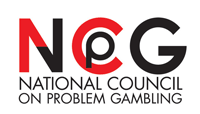The OSGA and Responsible Online Gambling
Problem Gambling affects everyone. Below you can find the information you need to get yourself or someone you care about help with a gambling problem!
OSGA wants you to play responsibly!
Please take a minute to learn more about responsible gaming online. The key is to play for entertainment, not to make money or relieve stress. Online gambling involves spending money over time, just like any other form of entertainment. The odds ensure that over time the player will not come out ahead.

The Mission of the National Council on Problem Gambling is to increase public awareness of pathological gambling, ensure the widespread availability of treatment for problem gamblers and their families, and to encourage research and programs for prevention and education.
What is Problem Gambling?
Problem gambling is gambling behavior which causes disruptions in any major area of life: psychological, physical, social or vocational. The term "Problem Gambling" includes, but is not limited to, the condition known as "Pathological", or "Compulsive" Gambling, a progressive addiction characterized by increasing preoccupation with gambling, a need to bet more money more frequently, restlessness or irritability when attempting to stop, "chasing" losses, and loss of control manifested by continuation of the gambling behavior in spite of mounting, serious, negative consequences.
Tips for being more responsible with your gaming habits:
- Gambling is just for fun, not a way of earning money.
- Only play when you are relaxed and concentrated.
- Take regular breaks.
- Decide your monthly gaming stake in advance. Independently of your standard deposit limits, you should set a lower amount based on that month's financial situation.
- Do not increase the maximum limit which you have decided for yourself later on.
- Before you start playing, decide the winning amount at which you will end the game.
- Decide beforehand how high your losses can be.
- Never play under the influence of alcohol or medication.
- Never play if you are feeling depressed.
If online gambling isn’t fun anymore or if you or someone you know may have a gambling problem. hope and help is available.
In the US, call the National Problem Gambling Helpline (800.522.4700) or goto: www.ncpgambling.org for toll free and confidential help 24 hours a day, 7 days a week.- Get help from any of these organizations:
- ncpgambling.org
- gam-anon.org
- gamblersanonymous.org
- www.gamtalk.org
- www.gamcare.org.uk
World Wide Resources:
Gamblers Anonymous www.gamblersanonymous.org is a fellowship of men and women who share their experience, strength and hope with each other that they may solve their common problem and help others to recover from a gambling problem.
Gam-Anon www.gam-anon.org is a self-help organization for the spouse, family or close friends of compulsive gamblers.
Gam Talk www.gamtalk.org is an online forum for people with gambling problems to share their experiences and ideas.
GamCare (www.gamcare.org.uk) GamCare provides support, information and advice to anyone suffering through a gambling problem.
Additional Resources:
The Brief Addiction Science Information Source (BASIS)
Your "First Step to Change" Online Workbook
This free, anonymous online guide will help you understand gambling, figure out if you need to change, and decide how to deal with the actual process of change.
A similar tool is the: Freedom From Gambling Workbook
If you are unsure whether or not you may have developed a gambling problem, you can use the following simple checklist for self-assessment. If you answer positively to at least four of the following questions it is recommended you call one of the professional bodies highlighted in ths article to seek professional advice.
- Preoccupation: Do you find that you are becoming preoccupied with past gambling successes?
- Tolerance: Do you find that you need to increase the amount of money you gamble to achieve the same enjoyment and excitement?
- Unable to stop: Have you recently tried to stop gambling but were unsuccessful?
- Irritability: Do you become moody or impatient when you are cutting down how much you gamble?
- Escape from reality: Do you ever use gambling a way of ignoring stress in your in life or even pick you up when you feel down?
- Chase losses: Do you ever try to win back the money you lost by increasing the size or frequency of your wagers?
- Conceal involvement: Do you ever hide how much or how often you gamble from significant others?
- Unsociable behaviour: Have you ever committed fraud or theft to get money to gamble with?
- Ruin a relationship/opportunity: Has gambling ever ruined a personal relationship or an occupational or educational opportunity?
- Bail-out: Have you ever needed others to relieve a financial problem created by gambling?



















